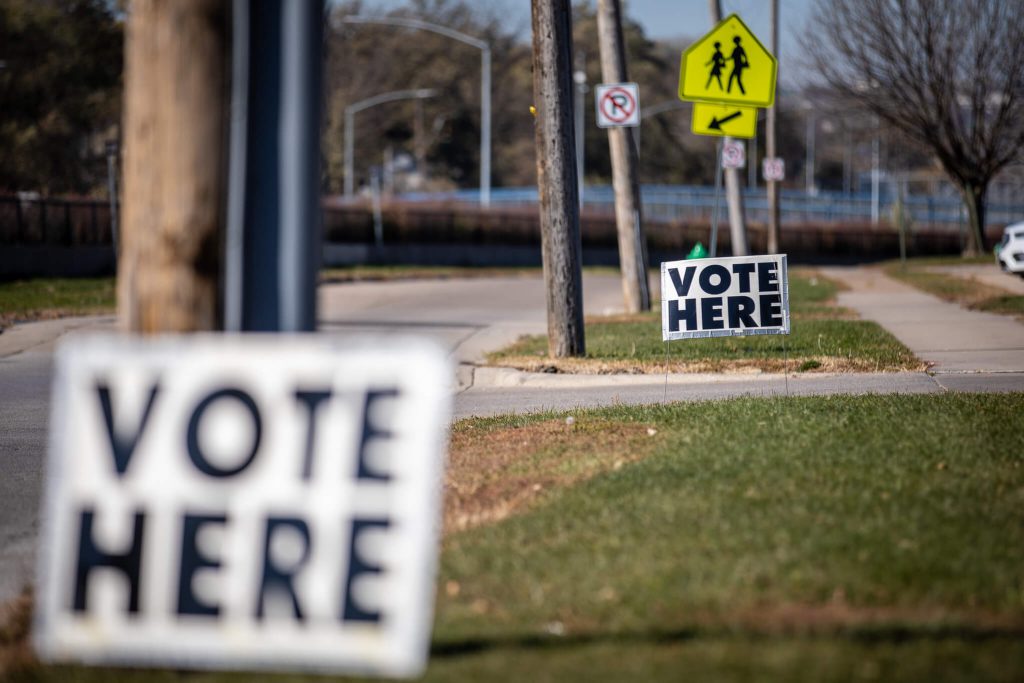Big Surge in Women Registering to Vote
Wisconsin has third biggest surge in U.S. since Roe overthrown. Could help decide election.

Election Day 2020. Photo by Phil Roeder via Flickr (CC BY 2.0) https://creativecommons.org/licenses/by/2.0/legalcode
The landslide defeat of a constitutional amendment to end abortion rights in a deep-red state like Kansas was a wakeup call that the issue could be much more important in the fall election than many in both parties had predicted. And data on voter registrations suggests the issue could be very big in Wisconsin.
Since the U.S. Supreme Court’s Dobbs decision on June 24 overruling Roe v. Wade, there has been a surge in women registering to vote, as several analysts have found. Typically new people registering to vote are about 50% women, reflecting their percent of the total population. But TargetSmart, a Democratic political data and data services firm, has found an edge in women registering to vote of at least 5% in 19 states since the Dobbs decision. Wisconsin ranked third, behind Kansas and Indiana, with a 17% edge for women.
Bonier’s data showed Pennsylvania ranked fifth highest, with a 12% edge in women among new voter registrations. But other data suggests it could be much higher. The election watchdog group, Committee of 70, found the state has seen 65,000 new registered voters since the end of June, compared to just 25,000 at this point last year. About two-thirds of the new voters were women.
“This is very typically close to a 50/50 split. It’s just a consistent thing. So this is… unprecedented,” as Lauren Cristella, chief program officer at the Committee of 70, told a Philadelphia news station.
An analysis by the Washington Post found the same edge for women in new voter registrations in Pennsylvania.
The Dobbs decision has closed the enthusiasm gap leading into the fall election. In March, Republicans had a 17 percentage point advantage on that question, according to NBC. By August, an NBC poll found that Democrats had closed a significant enthusiasm gap: 68% of Republicans expressed a high level of interest in the upcoming election, while 66% of Democrats said the same.
In Wisconsin, the huge edge in new voter registrations for women was accompanied by an even bigger overall edge for the Democratic Party: TargetSmart found that Democrats made up 52.36% of the 47,048 newly registered voters since June 24, compared with 16.59% of new voters registering as Republicans. How did it come up with this data, given that Wisconsin “does not collect information on the gender, race or political party affiliation of registered voters,” according to the Wisconsin Elections Commission?
Jack Sullivan Associate, Public Affairs for TargetSmart, says its data crunchers “append a wide range of data to the publicly available voter files acquired from state election departments, including demographic and consumer data. We also use statistical models to fill in gaps in information — because gender is not reported in Wisconsin, we utilize third party data and models.”
And yet the group is so confident in its figures it estimates it them down to to 0.36% — perhaps too fine a point for what might be a more general trend.
But that’s not happening in Wisconsin. Republican Tim Michels has done nothing to downplay his views on abortion. The millionaire businessman has declared that Wisconsin’s 1849 abortion ban, which allows no exceptions for victims of rape or incest, is in line with his personal beliefs. “I’m pro-life because of my faith, and I will not apologize for it,” he has said.
That puts him into opposition with 60% of voters who oppose the overturning of Roe, and the 88% who support abortions for victims of rape and incest, according to the Marquette Law School poll.
Michels faced a key decision after the Journal Sentinel did a story documenting donations by him and his wife to anti-abortion, anti-contraception and anti-LGBT groups. He could have said nothing and given the story no oxygen, hoping that it died. Instead he attacked the media, stoking the anger of his supporters and calling on them “to get out on the streets with pitchforks and torches” to oppose such reporting. In the process, he is making a campaign that was supposed to be about issues like inflation and crime, where Republicans believe they have an advantage, to issues like abortion, where Democrats have most voters behind them.
The Michels campaign may have been operating on the principle that anger drives voter turnout. Back in 2019, the revelation that state Supreme Court candidate Brian Hagedorn founded and oversaw a private religious school that prohibits teachers, students and parents from being in gay relationships became a sore point for his supporters, who were angry at this media coverage. The issue helped drive a higher turnout of conservative Republican voters, with Hagedorn winning a surprise victory.
But as Democratic consultant Sachin Chheda noted in an interview with Urban Milwaukee, that election was very different than this one, because (1) it was a low-turnout spring election and (2) Roe v. Wade was still the law of the land. The overturning of Roe is driving anger and voter registration among women voters and every attempt by Michels to stoke anger about the coverage of his donations to “religious” groups, as he has put it, that are anti-abortion, reminds voters of his stance on abortion.
More than likely we’ll be seeing ads reminding voters of where Michels and Johnson stand on this issue. Planned Parenthood has committed to spending $50 million on the midterms — more than it has spent on any past election — while focusing on key states with both Senate and gubernatorial races, including Pennsylvania, Arizona and Wisconsin. That, too, is likely to drive the turnout of women in this election. In a state as close as Wisconsin, which Joe Biden won by 30,000 votes in 2020, Tony Evers won by 30,000 votes in 2018 and Donald Trump by less than 24,000 votes in 2016, a shift in how women vote could carry the day.
Murphy's Law
-
National Media Discovers Mayor Johnson
 Jul 16th, 2024 by Bruce Murphy
Jul 16th, 2024 by Bruce Murphy
-
Milwaukee Arts Groups in Big Trouble
 Jul 10th, 2024 by Bruce Murphy
Jul 10th, 2024 by Bruce Murphy
-
The Plague of Rising Health Care Costs
 Jul 8th, 2024 by Bruce Murphy
Jul 8th, 2024 by Bruce Murphy




















